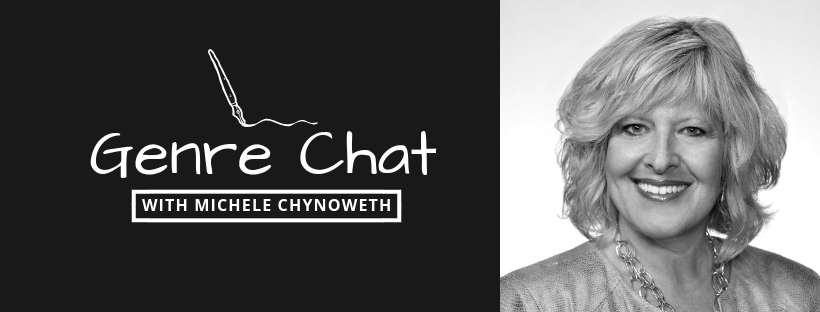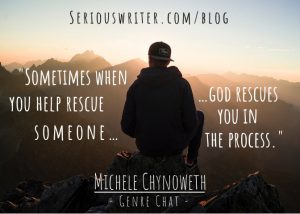
Genre Chat – Michele Chynoweth – Contemporary Bible Stories
Michele Chynoweth is the best-selling and award-winning author of The Faithful One, The Peace Maker and The Runaway Prophet, contemporary suspense novels that re-imagine Old Testament stories in the Bible. Michele is also an inspirational speaker, giving workshops at writers conferences across the country, a college writing instructor and a book coach, helping other writers become successful authors through her editing services and assistance with publishing and marketing their books. A graduate of the University of Notre Dame, she and her husband have a blended family of five children and live in North East, Maryland.
Michele Chynoweth – Contemporary Bible Stories
Caleb: Tell us more about yourself and the different things you’re involved in.
Michele: I am the author of three books that are out so far with the fourth coming out next year. I’m also an inspirational speaker. I speak at a lot of writer’s conferences about what I do as an author. That led me to become a writing instructor at Cecil Collage in my hometown of North East, Maryland. I teach “Writing Your Book” and also “How to Get Published.” I have 30 years of marketing experience. After I graduated collage, I was a news reporter. Then I went into marketing and the advertising world, and had my own ad agency for 20 years. Of course I became an author along the way, and love teaching what I know. I’ve always had my hand in writing.
Caleb: I wanted to talk a lot about your contemporary Bible stories. First, can you define your genre in a little more detail and explain why you decided to write these types of stories?
Michele: I’d like to say it chose me. My novels are contemporary suspense with a little romance. I call them Edgy Inspirational Fiction. They’re based on Old Testament stories in the Bible. You could consider them “Christian Fiction”, but also outside of that – they cater to a non-denominational and even universal audience. They re-imagine the stories in the Old Testament in a contemporary way with characters and plots we can relate to today. But I stay true to the plot.
I’ve always wanted to write since I was ten years old, and life happened. Along the way that writing bug bit me again and I wrote what I thought was the Great American Novel. It won the drama fiction contest for the Maryland Writers Association. The prize was literary agency representation with Writer’s House in New York. Then 9-11 happened, and they were in New York. We all lost the prizes and that book never saw the light of day. I was devastated.
I was driving along one day and the thought hit me out of the blue, “You should write a book based on the story of Job.” At the time, I wasn’t a big Bible reader. I just wanted to be rich and famous at the time. I thought “How is that going to get me there?” But it wouldn’t let go. So I started writing it, and I realized God was trying to tap me on the shoulder. I was going through a lot of Job like stuff: losing my marriage, losing my business, losing my health. I had the family disease of alcoholism. In the end, God brought me through all that, and in the end it helped me and now I help others. Fast-forward to today and I’m living my dream as an author, speaker and book coach. That book became “The Faithful One”, my first novel, and set me on the path to this genre.
Caleb: What inspires you to modernize these stories? How do you go about choosing what to change and what to keep the same?
Michele: That story hit me. I got it self-published originally. Then a Christian publisher picked it up and published it. They were coming up with a new genre – re-imagined Bible stories. A friend of mine suggested that I write the next one based on Abigail. I said “Abigail who?” and he said to look her up in the Bible. Abigail becomes the second wife of King David. Before that she was originally married to Nabal, who’s a mean, narcissistic bad guy. I thought that if I modernize it, David and Nabal could be running for President of the United States and Abigail gets stuck in the middle. That idea became “The Peace Maker”, my next novel.
I had been fighting this whole idea of “do I want to write in this genre?” At first, I just wanted to be rich and famous, now I realize it’s more about following God’s call and helping others. Bits and pieces of me are in there, or people I know. So I piece those stories together, but I really stay true to the plot and re-imagine them in a modern day way.
Caleb: What do you find is the main difference between writing in this genre and writing other types of fiction? What is different and what is the same?
Michele: This is somewhat of a new genre. What makes it different is that it bridges the gap between Christian fiction, which tends to be very clean. My books are clean and meet those Christian guidelines, but they’re also universal. They have themes and characters that are real. “The Runaway Prophet” is set in Las Vegas, and there’s prostitution and there’s gambling, and drug-addicts. There’s an underground, radical Islamic terrorist group trying to destroy Las Vegas, which is like a modern-day Nineveh. It’s real. It’s gritty. And that’s really what’s in the Bible.
Caleb: One of my writing friends, Molly Jo Realy, pointed out to me that you can’t really show how God can rescue you, until you show what He can rescue you from.
Michele: And sometimes when you help rescue someone, God rescues you in the process. That’s part of the message as well. I try to get to that underlying message that I think we miss in those Old Testament stories because they’re hard to read – hard to comprehend. So I try to uncover that, but not in a preachy or religious way.
Caleb: How has this given you more insight into the Bible? I’m guessing you had to really dig deep into these characters for research. Has this helped you more in your spiritual life?
Michele: Absolutely! I’ve actually sat down and read the Bible cover to cover. What I do is start with good research tools that get into the history, the wording and God’s messages. And then I also authenticate each novel with somebody in the clergy in various denominations. I want to make sure I’m following the Scripture’s story.
Caleb: How do you research your characters? What tools have you used to help get in the mindset of someone who lived thousands of years ago?
Michele: I do it more in a contemporary way. I really base my characters on bits and pieces of people I know. When I visualize them, I tend to think like a movie director. When you’re writing that kind of contemporary, fast-paced fiction, it should unravel like a movie.
Caleb: Tell us a little more about your writing process. Are you an organic writer or an outliner?
Michele: I’m a big advocate of a chapter outline. I feel like I need a road map. You’re going to veer off a little, as it changes and evolves. But at least you know where it’s going.
Caleb: If you could give one piece of advice to an aspiring author, what would that advice be?
Michele: Don’t lose your passion. Stay at it! Carve out your writing time and carve out time for you. You’re worth it!
Michele can be found on social media and through her website: Michelechynoweth.com
Michele offers book coaching through her website Bookcoachmichele.com

